Story by John Paul Tasker • CBC
MPs overwhelmingly voted to kill a bill Wednesday pushed by Conservative Leader Pierre Poilievre that would have banned Ottawa from again imposing COVID-19 vaccine mandates on federal workers and the travelling public.
By a vote of 114-205, MPs agreed to drop the private member's bill, C-278, that Poilievre first introduced last year when he was running for the party's leadership.
The bill was subsequently picked up by Conservative MP Dean Allison, a noted anti-mandate critic who, like his leader, supported the trucker convoy that loudly opposed the government's approach to COVID-19.
Its failure to pass was not unexpected.
Prime Minister Justin Trudeau said Poilievre is choosing to "wear a tinfoil hat" by backing this sort of "divisive" legislation — a reference to conspiracy theorists. NDP and Bloc Québécois MPs made similarly dismissive comments.
Poilievre's promotion of the bill, however, suggests the Tories are not yet ready to drop their opposition to the COVID policies that outraged some in the party base.
Speaking in the House of Commons during Tuesday's debate, Poilievre said Trudeau "maliciously divided" and attacked Canadians who shunned the COVID-19 vaccine by imposing an "unreasonable" policy that forced some people to get the shot or face consequences like job losses or additional hurdles at the border.
Related video: Poilievre: Anti-vaccine-mandate bill would 'restore personal freedom' (cbc.ca) Duration 0:56 View on Watch
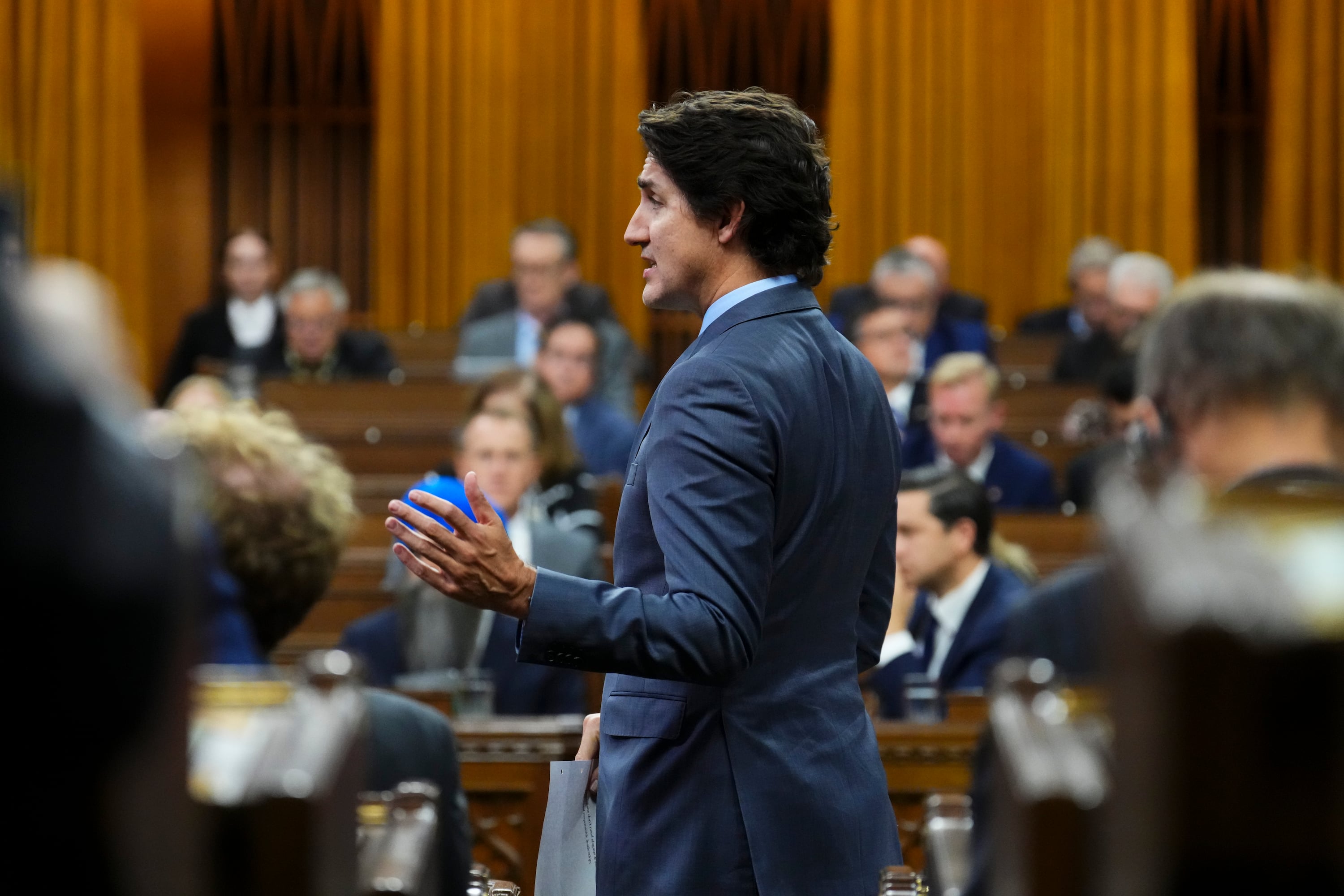
 cbc.ca Poilievre wearing 'tin foil hat' on vaccines: Trudeau
cbc.ca Poilievre wearing 'tin foil hat' on vaccines: Trudeau1:22

Global News
Trudeau, NDP have 'violated constitutional rights of Canadians,' Poilievre says after Supreme Court rejects Bill C-69
2:11
"He divided, insulted and name-called millions of people right across this country who are patriotic, law-abiding, decent people," Poilievre said of the government's now-defunct vaccine mandate policy.
Trudeau went beyond "guiding and protecting Canadians to punishing people who chose not to take the COVID-19 vaccine," Poilievre said.
Days after announcing the mandate, Trudeau "called an election and attempted to exploit that political moment in order to regain power," Poilievre said.
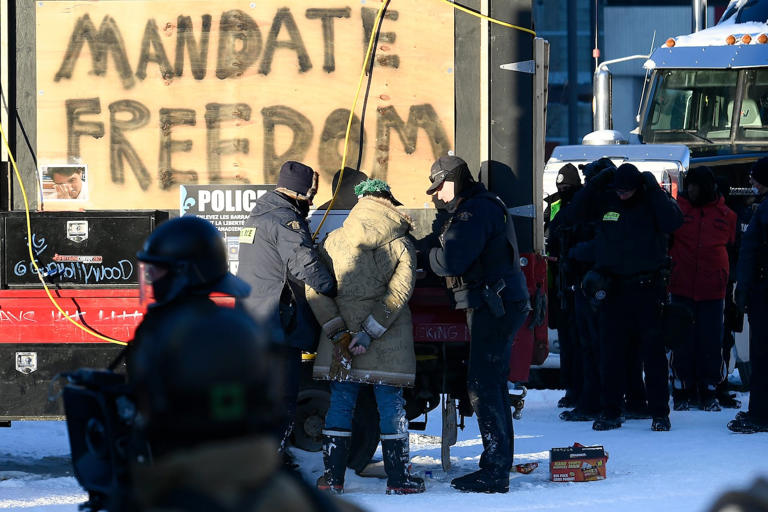
RCMP officers take a protester into custody at the Ottawa anti-vaccine mandate protest in February, 2022. (Justin Tang/Canadian Press)© Provided by cbc.ca
The policy did feature prominently in the 2021 federal election as the Liberal Party routinely highlighted ex-leader Erin O'Toole's opposition to the mandates.
There hasn't been a COVID-19-related mandate in place since last year, when Ottawa dismantled its regime as the virus became more manageable.
When the vaccination requirement for federal public servants was lifted in June 2022, employees who had been placed on leave without pay had a chance to return to their regular work duties.
Poilievre argued the legislation is necessary now because Ottawa could reimpose its mandates.
Poilievre said he supports "bodily autonomy" and believes all Canadians can decide for themselves what they put in their own bodies.
The vast majority of the party's delegates at a recent policy convention agreed with that position.
About 68 per cent of delegates in Quebec City voted to affirm that Canadians should have "the freedom and right to refuse vaccines."
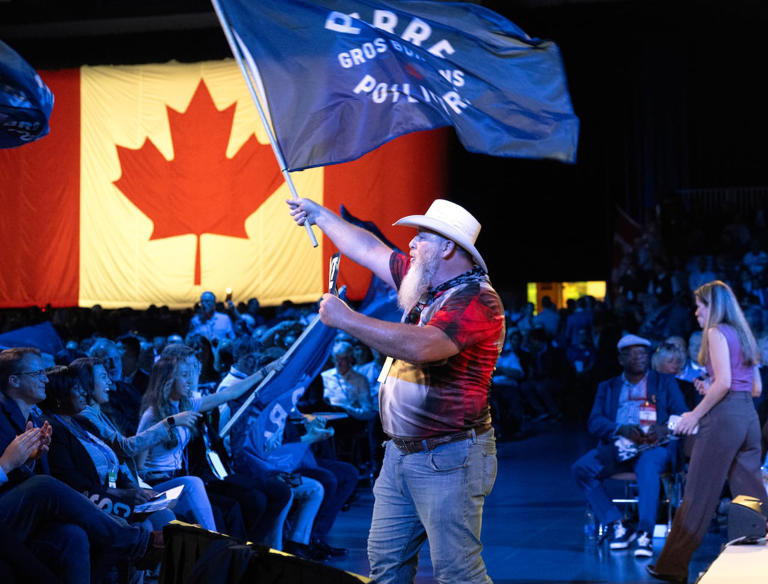
Conservative delegate Patrick Wuori calls on the crowd prior to party leader Pierre Poilievre's speech at the Conservative Party convention on September 8, 2023 in Quebec City. (Jacques Boissinot/Canadian Press)© Jacques Boissinot/Canadian Press
Adopting this bill, Poilievre said, would be a "recognition that this ugly chapter in our history, of turning Canadians against Canadians and using a public health matter to pull apart our country, is permanently behind us."
The Liberal government has long defended its vaccine mandate policy as a suite of measures designed to keep people safe from a deadly virus. More than 50,000 Canadians have died of COVID-19, according to public health data.
The government has said it imposed its mandates to encourage more people to take the shots, which have been credited by public health officials with helping the country emerge from the pandemic.
The vast majority of Canadians heeded public health advice and got at least two doses of a COVID-19 vaccine. At last count, about 84 per cent of all people aged five and older are considered "fully vaccinated," according to federal data.
In question period, Trudeau pounced on Polievre's anti-mandate rhetoric.
He said the Conservative leader "doesn't much care about facts" regarding Canada's pandemic response. He said Poilievre "doesn't truly want to accept" that most people in Canada willingly got a shot.
"He has a hidden agenda driven by ideology — an ideology rooted in denying that the government had to act fast in a once-in-a-century moment to keep Canadians safe," Trudeau said.
"He continues to play divisive games to try and divide Canadians on a matter core to public health and public safety. We've always stood up for the safety of Canadians while he chooses to wear a tinfoil hat."
Liberal MP Kevin Lamoureux called the Conservative approach to pandemic management "irresponsible" and "reckless."
"Contrary to what the Conservative Party tries to espouse, vaccinations worked. Vaccinations made a difference," he said during debate on the bill Tuesday.
"I believe that there are some who recognize the importance of public health and see the valuation of vaccinations," Lamoureux said of Conservative MPs. "But a good portion do not, and this is from the leader down."
Liberal MP Chris Bittle said there's no doubt about why Poilievre is pushing this policy.
"We know who they are trying to rally to. They closed down this city for a few weeks. They closed down international borders. They tried to grind the economy to a halt," he said of the trucker convoy.
"In another pandemic, we would not want that party in charge. It is just not worth the risk."
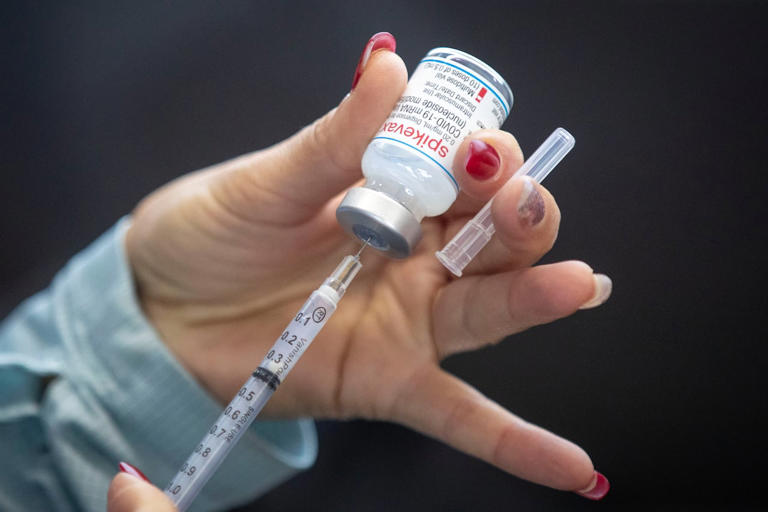
A person prepares a Moderna vaccine dose at a COVID-19 vaccine clinic at St. Lawrence College in Kingston, Ont. in January 2022. (Lars Hagberg/The Canadian Press)© Provided by cbc.ca
NDP MP Don Davies, the party's health critic, said Poilievre has peddled "misinformation" about this legislation.
The bill would only ban COVID-19 mandates — but some Conservative Party literature has suggested it would prevent future vaccine mandates.
While agreeing with the Conservatives' claim that Trudeau and the Liberals "politicized" Canada's pandemic response, Davies said passing this legislation could tie the hands of the government if COVID-19 returns as a pressing public health threat.
Davies said the decision to impose a vaccine requirement should "always be based on the best available evidence, current science and advice of experts," not Conservative MPs "with little or no background in any of those things."
Bloc Québécois MP Caroline Desbiens said her party "refuses to buy the conspiracy theories" that the Conservative party is "selling" about vaccine mandates.
She said the bill is Allison's "umpteenth attempt to discredit vaccines."
"COVID-19 was not a conspiracy. It was a tragedy," she said in French.
"The Conservatives' sympathies lie with pandemic deniers. Our entire society could someday have to sacrifice its safety and security to the anti-vax beliefs of a small group of people who are still in denial."
Allison defended the bill, saying it was "wrong to divide and discriminate against Canadians based on a personal medical decision."
"It was wrong for the government to demonize Canadians who did not agree with the heavy-handed approach of imposing unscientific mandates," he said.
The idea that the mandates were "unscientific" is up for debate.
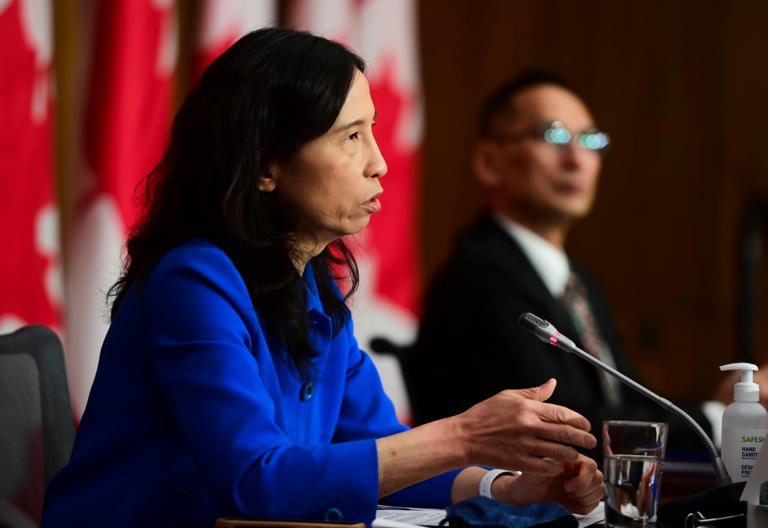
Chief Public Health Officer Dr. Theresa Tam and Dr. Howard Njoo, deputy chief public health officer, hold a press conference during the COVID-19 pandemic in Ottawa. (Sean Kilpatrick/Canadian Press)© Provided by cbc.ca
Dr. Theresa Tam, Canada's chief public health officer, has defended the various vaccine mandates. She said in February 2022 that it was "obvious" they worked.
"We saw a plateau in the uptake of vaccines after a really tremendous effort by Canadians, and then after the introduction of vaccine mandates by the various provinces and territories and jurisdictions, we did see an uptick," she said.
But Tam also said a month later that it was time to re-examine the policy because the science showed the primary series of the COVID-19 vaccine — the first two doses — offer very little protection against an Omicron infection, which was by then the dominant strain.
The government then started dismantling the mandates as public health officials started to shift their positions on their effectiveness.
Allison said the mandates "damaged our country like I have never seen before."
"Folks were fired. Folks lost their livelihoods. I cannot believe this actually happened here in Canada," he said.
2:11
"He divided, insulted and name-called millions of people right across this country who are patriotic, law-abiding, decent people," Poilievre said of the government's now-defunct vaccine mandate policy.
Trudeau went beyond "guiding and protecting Canadians to punishing people who chose not to take the COVID-19 vaccine," Poilievre said.
Days after announcing the mandate, Trudeau "called an election and attempted to exploit that political moment in order to regain power," Poilievre said.

RCMP officers take a protester into custody at the Ottawa anti-vaccine mandate protest in February, 2022. (Justin Tang/Canadian Press)© Provided by cbc.ca
The policy did feature prominently in the 2021 federal election as the Liberal Party routinely highlighted ex-leader Erin O'Toole's opposition to the mandates.
There hasn't been a COVID-19-related mandate in place since last year, when Ottawa dismantled its regime as the virus became more manageable.
When the vaccination requirement for federal public servants was lifted in June 2022, employees who had been placed on leave without pay had a chance to return to their regular work duties.
Poilievre argued the legislation is necessary now because Ottawa could reimpose its mandates.
Poilievre said he supports "bodily autonomy" and believes all Canadians can decide for themselves what they put in their own bodies.
The vast majority of the party's delegates at a recent policy convention agreed with that position.
About 68 per cent of delegates in Quebec City voted to affirm that Canadians should have "the freedom and right to refuse vaccines."

Conservative delegate Patrick Wuori calls on the crowd prior to party leader Pierre Poilievre's speech at the Conservative Party convention on September 8, 2023 in Quebec City. (Jacques Boissinot/Canadian Press)© Jacques Boissinot/Canadian Press
Adopting this bill, Poilievre said, would be a "recognition that this ugly chapter in our history, of turning Canadians against Canadians and using a public health matter to pull apart our country, is permanently behind us."
The Liberal government has long defended its vaccine mandate policy as a suite of measures designed to keep people safe from a deadly virus. More than 50,000 Canadians have died of COVID-19, according to public health data.
The government has said it imposed its mandates to encourage more people to take the shots, which have been credited by public health officials with helping the country emerge from the pandemic.
The vast majority of Canadians heeded public health advice and got at least two doses of a COVID-19 vaccine. At last count, about 84 per cent of all people aged five and older are considered "fully vaccinated," according to federal data.
In question period, Trudeau pounced on Polievre's anti-mandate rhetoric.
He said the Conservative leader "doesn't much care about facts" regarding Canada's pandemic response. He said Poilievre "doesn't truly want to accept" that most people in Canada willingly got a shot.
"He has a hidden agenda driven by ideology — an ideology rooted in denying that the government had to act fast in a once-in-a-century moment to keep Canadians safe," Trudeau said.
"He continues to play divisive games to try and divide Canadians on a matter core to public health and public safety. We've always stood up for the safety of Canadians while he chooses to wear a tinfoil hat."
Liberal MP Kevin Lamoureux called the Conservative approach to pandemic management "irresponsible" and "reckless."
"Contrary to what the Conservative Party tries to espouse, vaccinations worked. Vaccinations made a difference," he said during debate on the bill Tuesday.
"I believe that there are some who recognize the importance of public health and see the valuation of vaccinations," Lamoureux said of Conservative MPs. "But a good portion do not, and this is from the leader down."
Liberal MP Chris Bittle said there's no doubt about why Poilievre is pushing this policy.
"We know who they are trying to rally to. They closed down this city for a few weeks. They closed down international borders. They tried to grind the economy to a halt," he said of the trucker convoy.
"In another pandemic, we would not want that party in charge. It is just not worth the risk."

A person prepares a Moderna vaccine dose at a COVID-19 vaccine clinic at St. Lawrence College in Kingston, Ont. in January 2022. (Lars Hagberg/The Canadian Press)© Provided by cbc.ca
NDP MP Don Davies, the party's health critic, said Poilievre has peddled "misinformation" about this legislation.
The bill would only ban COVID-19 mandates — but some Conservative Party literature has suggested it would prevent future vaccine mandates.
While agreeing with the Conservatives' claim that Trudeau and the Liberals "politicized" Canada's pandemic response, Davies said passing this legislation could tie the hands of the government if COVID-19 returns as a pressing public health threat.
Davies said the decision to impose a vaccine requirement should "always be based on the best available evidence, current science and advice of experts," not Conservative MPs "with little or no background in any of those things."
Bloc Québécois MP Caroline Desbiens said her party "refuses to buy the conspiracy theories" that the Conservative party is "selling" about vaccine mandates.
She said the bill is Allison's "umpteenth attempt to discredit vaccines."
"COVID-19 was not a conspiracy. It was a tragedy," she said in French.
"The Conservatives' sympathies lie with pandemic deniers. Our entire society could someday have to sacrifice its safety and security to the anti-vax beliefs of a small group of people who are still in denial."
Allison defended the bill, saying it was "wrong to divide and discriminate against Canadians based on a personal medical decision."
"It was wrong for the government to demonize Canadians who did not agree with the heavy-handed approach of imposing unscientific mandates," he said.
The idea that the mandates were "unscientific" is up for debate.

Chief Public Health Officer Dr. Theresa Tam and Dr. Howard Njoo, deputy chief public health officer, hold a press conference during the COVID-19 pandemic in Ottawa. (Sean Kilpatrick/Canadian Press)© Provided by cbc.ca
Dr. Theresa Tam, Canada's chief public health officer, has defended the various vaccine mandates. She said in February 2022 that it was "obvious" they worked.
"We saw a plateau in the uptake of vaccines after a really tremendous effort by Canadians, and then after the introduction of vaccine mandates by the various provinces and territories and jurisdictions, we did see an uptick," she said.
But Tam also said a month later that it was time to re-examine the policy because the science showed the primary series of the COVID-19 vaccine — the first two doses — offer very little protection against an Omicron infection, which was by then the dominant strain.
The government then started dismantling the mandates as public health officials started to shift their positions on their effectiveness.
Allison said the mandates "damaged our country like I have never seen before."
"Folks were fired. Folks lost their livelihoods. I cannot believe this actually happened here in Canada," he said.
No comments:
Post a Comment